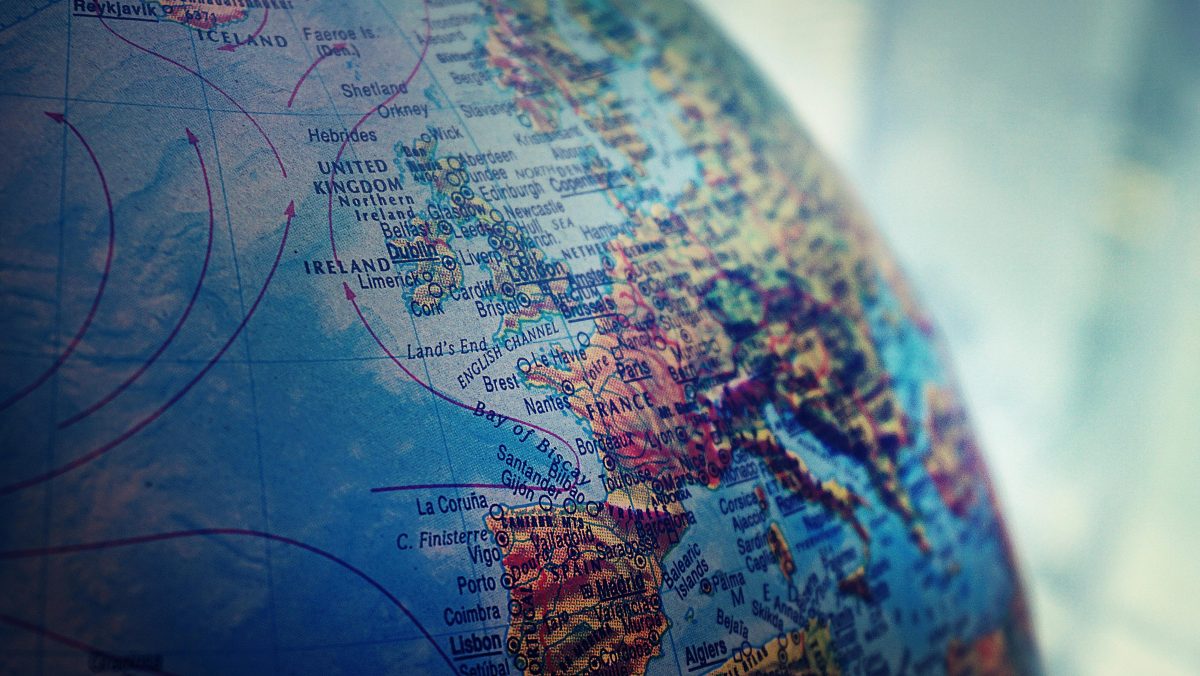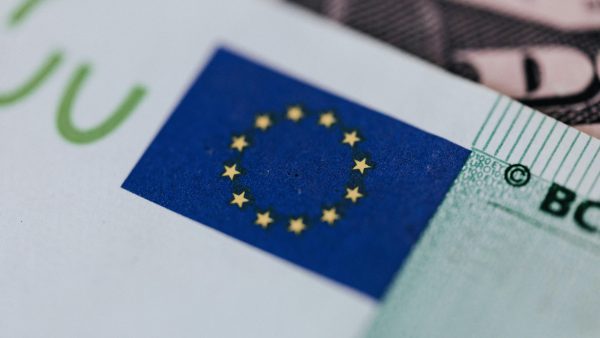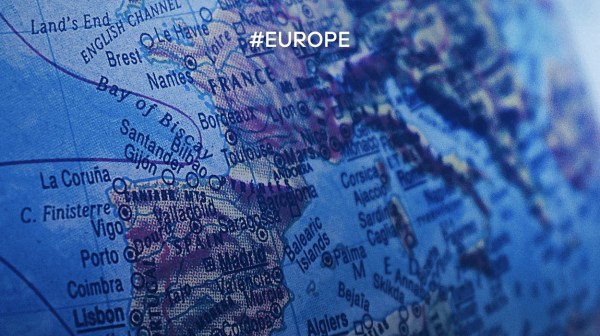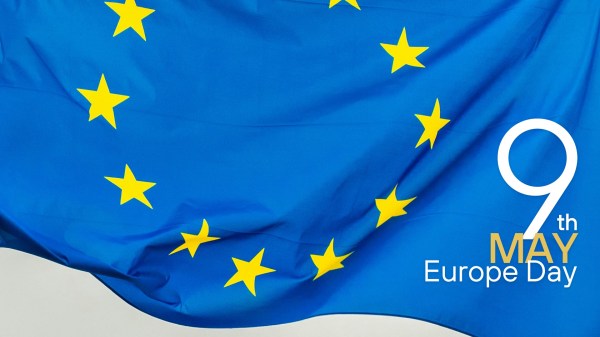After bringing more than half of the world’s population to the polls, 2025 began with new political cycles in more than seventy countries. These new phases are taking place at a challenging time marked by an unstable geopolitical environment, deteriorating multilateralism, emerging protectionism, and a shift in the system of alliances.
The search for conflict resolution seems to be generating new tensions rather than stability.
The inclination towards plurilateral agreements is replacing cooperation on global issues with common interests. Global trade dynamics risk being fractured by protectionist policies. The ties that bound traditional coalitions seem to be slowly unravelling.
These risks are not unknown in history, but they take on a new dimension in the current digital age.
Conflicts transcend the physical world and extend into the virtual realm through cyberattacks. The ambition to achieve global governance models for new technologies that guarantee the protection of fundamental rights and democratic values is fading. Raw materials and semiconductors are key pieces of the global puzzle. The creation of a collaborative innovation environment that extends its benefits to all societies is being undermined.
But it is not all negative.
These recent geopolitical events have drastically raised the temperature in Europe, preventing it (as in the fable of the frog) from becoming complacent and ultimately succumbing to a more competitive and future-ready international landscape.
We are at a turning point for a large part of the population with the realisation of Europe’s weakened position. However, as this publication will explain, the decline in Europe’s relevance has not happened suddenly, but has been building for years, remaining underlying beneath layers of European values such as cooperation, sustainable development and social welfare that positioned Europe as an international benchmark.
Recent geopolitical events
Recent geopolitical events have made 2025 a turning point for much of the population, with a growing awareness of Europe’s weakened position. However, this publication will explain that the decline in European relevance has not happened suddenly, but has been building for years, remaining underlying beneath the layers of European values such as cooperation, sustainable development and social welfare that positioned Europe as an international benchmark.
Europe’s golden age: growth, prominence and influence
The Second World War ended with a Europe that was exhausted, with a decimated population, a partially destroyed infrastructure and a weakened economy. Faced with this adverse scenario, European countries rallied around their spirit of cooperation, establishing three communities – the European Coal and Steel Community, the European Atomic Energy Community and the European Economic Community – which gave new impetus to their growth. The positive results in the economies of the member countries led them to expand their cooperation and create the European Union (EU). In this sense, European countries moved towards a political union beyond the economic sphere, establishing a borderless area for the free movement of people, goods, services and capital. This provided EU member countries with greater financial market integration, new investment opportunities, a boost to trade and prosperity for their citizens.
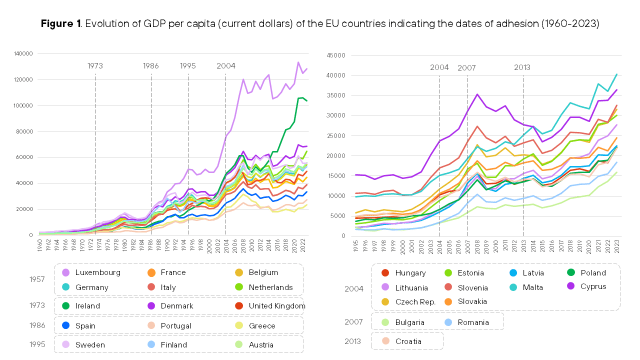
In addition, over the last two decades, the EU has forged an international role as a driver of progress and well-being, building on its values of cooperation, multilateralism, democracy, human rights, solidarity, action against climate change and inclusion. The EU has been a leading figure in international actions seeking to promote global well-being, such as the Paris Agreement and the UN Sustainable Development Goals, generating policies, regulation and monitoring to achieve the ambitious objectives of these initiatives.
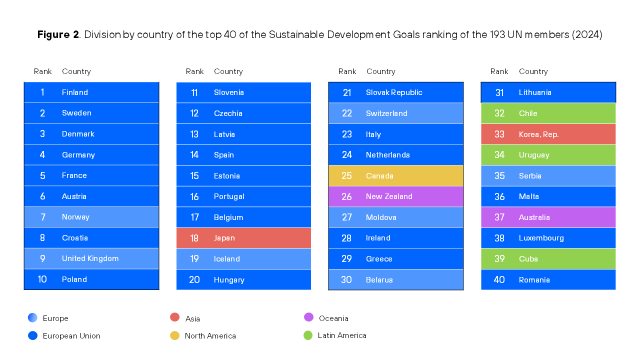
Finally, in recent years, the EU has established a new type of international power that had not previously been seen: the power of regulation. The region has proven to have considerable influence in defining how companies conduct their activities at the international level. European and foreign companies, which must comply with current regulations if they wish to continue accessing European consumers, apply EU requirements to all their activities and operations, thus extending European regulations to other markets. This phenomenon was highlighted by Anu Bradford in her book ‘The Brussels Effect’, in which she presents examples such as the role of the General Data Protection Regulation (GDPR) in establishing the global privacy policies of large technology companies in Silicon Valley.
The end of the mirage: a stagnant and less relevant Europe
In a context of stability, the boost given to European economies by the Single Market, European leadership in sustainable development and the international influence of the regulatory framework gave the EU a prominent role on the global stage. However, recent geopolitical events that have shaken the region have exposed the deteriorating foundations on which Europe built its position.
In his report ‘A Competitiveness Strategy for Europe’, Mario Draghi, former president of the European Central Bank, highlights that Europe’s low growth has been palpable since the beginning of the 21st century, which he attributes to a loss of productivity. Similarly, he argues that the decline in productivity is ‘largely due to Europe’s failure to join the digital revolution driven by the Internet’. However, if we look further back at the EU’s gross domestic product per capita and compare it with that of the other advanced economy at the time, the United States, we can see that the slowdown in growth began in the 1980s.
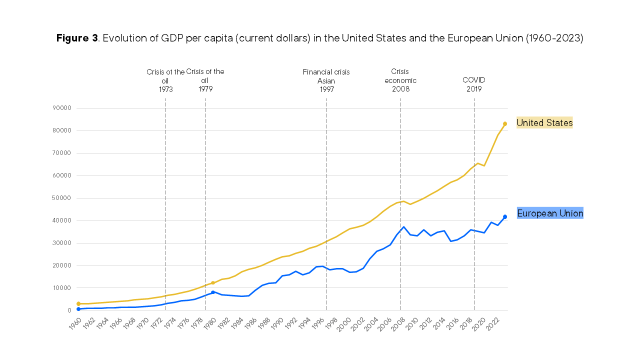
Coincidentally, during that decade, the United States was the epicentre of many of the fundamental technological advances that laid the foundations for the digital transformation. Among its most significant innovations were the popularisation of graphical user interfaces, improvements in microprocessors and the development of communication protocols between ARPANET’s central computers. In this way, the United States began to digitise its economy by making digital devices accessible to people without technical knowledge, increasing the speed, efficiency and capacity for data processing, and laying the foundations for what we would later know as the Internet.
It is true that in the same decade, the European economy was also affected by the oil crisis of 1979, a consequence of a problem that persists today: the region’s (enormous) energy dependence. However, the resilience of its economy can be attributed to a decline in productivity and, therefore, competitiveness.
Therefore, the roots of Europe’s loss of relevance predate the digital revolution driven by the Internet, dating back to the era of the major technological advances that gave rise to the Internet. Regardless of the origin, we arrive at the same conclusion offered by Draghi in his report: ‘the productivity gap between the EU and the United States is largely explained by the digital sector’.
The “big” question: why has Europe (so far) been left out of the digital revolution?
Given that Europe was one of the advanced economies at the beginning of the industrial revolution and has top-level researchers and universities, how has it become a secondary player in the digital arena dominated by the United States and China?
Draghi’s answer to this question is “innovation”. He attributes Europe’s low level of innovation to three factors: the difficulty of commercialising new advances, the scalability obstacles faced by innovative companies (start-ups), and the lack of coordination and fragmentation of financing instruments in Member States. However, two further aspects should be added to those identified by Draghi: the lack of replicability of innovation and the difficulty for large European companies to become global digital leaders.
On the one hand, Europe has not been agile enough to replicate innovations produced outside its borders, making it an importer of digital products and services. One example of this is the smartphone, which, beyond being an innovative device, became a gateway to new markets and opportunities in the digital world. In the early 2000s, Europe led the global mobile device market with Nokia, which achieved a 32% share in 2005. However, this landscape changed dramatically after the arrival of Apple’s iPhone in 2007. European companies lost market share, eventually disappearing almost entirely in recent years. In contrast, Asian companies experienced a boom, gaining a strong presence in the global market and becoming strong competitors to US companies. The factor behind these changes is replicability. While European companies failed to adapt to smartphone innovations, Asian companies managed to integrate them quickly and even add new innovations over time that drove their growth.
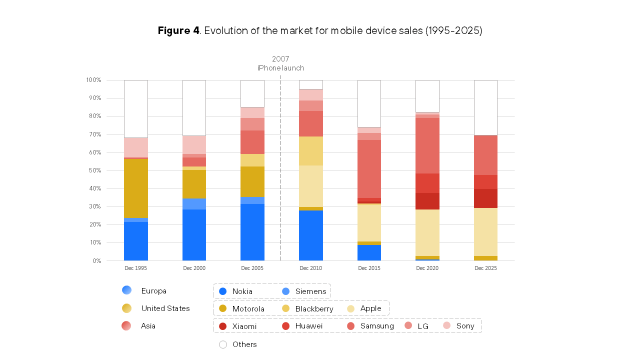
On the other hand, Europe has not managed to create an environment that is sufficiently enabling for its technology companies to grow and reach the calibre of their US counterparts. There are several variables that have hindered the scalability of these companies, but the most notable, and those on which the European Union has already focused, are regulation and competition policy. Europe has already taken its first steps towards regulatory simplification and has shown its willingness to review competition policy to bring it up to date with the new market realities, which are a far cry from its last review more than twenty years ago.
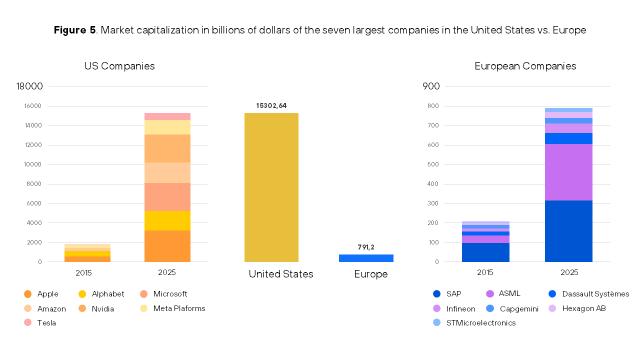
Conclusion
Europe appears to be starting from a disadvantageous position characterised by weakened international relevance. However, if the region is able to turn adversity into opportunity, we will witness the rebirth of Europe: a new era marked by leadership, competitiveness, strategic autonomy and resilience.

